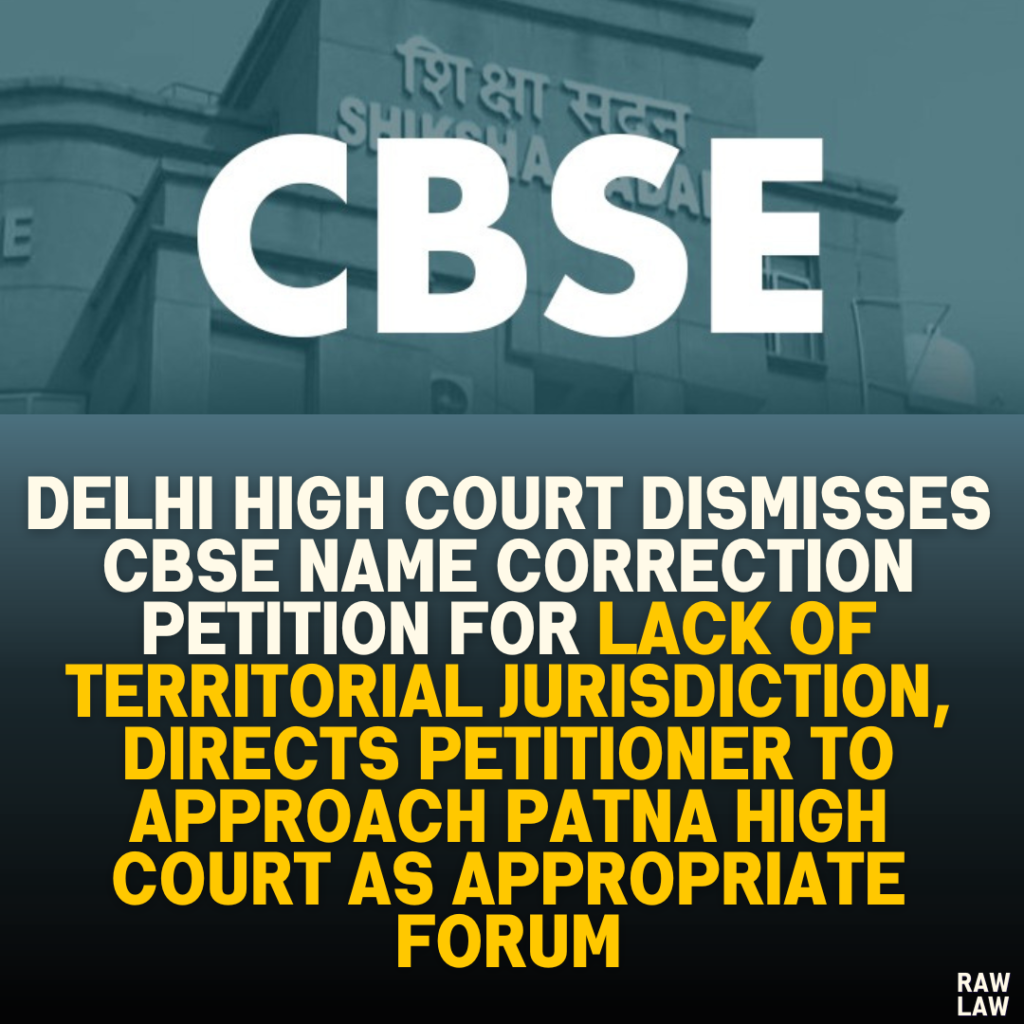Court’s Decision:
The Delhi High Court dismissed the petition, filed under Article 226 of the Constitution of India, solely on the ground of lack of territorial jurisdiction, clarifying that the petitioner’s case had not been decided on its merits. The Court advised the petitioner to approach the appropriate court in the relevant jurisdiction for redressal.
Facts:
The petitioner, having lived with her maternal family since childhood, discovered that her father’s name in her secondary and higher secondary school certificates was incorrectly listed as her maternal uncle’s name. After publishing a notification in the Gazette declaring her biological father’s name, she approached her school and the CBSE to request a correction. Despite representations to CBSE offices in both Bihar and Delhi, she received no response, prompting her to file this writ petition.
Issues:
- Whether the Delhi High Court has territorial jurisdiction to entertain the petition for name correction on the petitioner’s certificates.
- Whether the request for a name correction on official school records constitutes a minor correction or a substantive change.
Petitioner’s Arguments:
The petitioner argued that since the CBSE head office is located in Delhi, the Delhi High Court has the appropriate territorial jurisdiction. She further contended that the grievance primarily lies against CBSE, making the head office’s jurisdiction relevant.
Respondent’s Arguments:
CBSE opposed the petition, contending that both the petitioner’s school and the relevant regional office are located in Bihar. It argued that the petitioner’s request goes beyond a minor correction, involving a substantive change that conflicts with the existing school records, thus placing the matter outside the Delhi High Court’s jurisdiction.
Analysis of the Law:
The Court evaluated the concept of territorial jurisdiction under Article 226 of the Constitution, emphasizing that the presence of CBSE’s head office in Delhi alone does not automatically establish jurisdiction. It noted that without any cause of action arising within the local limits of the Delhi High Court, jurisdiction could not be conferred solely based on administrative convenience.
Precedent Analysis:
The Court referred to the Division Bench judgment in Smt. Manjira Devi Ayurveda Medical College and Hospital v. Uttarakhand University of Ayurveda, which held that the mere location of an office in Delhi does not confer jurisdiction. Additionally, the Court cited Kusum Ingots & Alloys Ltd. v. Union of India and State of Goa v. Summit Online Trade Solutions (P) Ltd., underscoring the doctrine of forum conveniens, which allows courts to decline jurisdiction if a more appropriate forum exists.
Court’s Reasoning:
The Court reasoned that since the petitioner’s school and CBSE’s regional office are both located in Bihar, and all related events transpired there, the Delhi High Court lacks a substantive connection to the case. Further, the Court reiterated that a minor presence of cause of action within a court’s jurisdiction does not obligate it to assume jurisdiction, especially when an alternative forum is more suited to the matter.
Conclusion:
The Delhi High Court dismissed the petition due to lack of territorial jurisdiction, highlighting that the petitioner should seek remedy in a more appropriate forum, such as the Patna High Court, where the matter has a more significant jurisdictional connection.
Implications:
This decision reinforces the doctrine of forum conveniens, where courts may decline jurisdiction if another jurisdiction is more appropriate. It emphasizes that administrative presence, such as a head office in a particular location, does not automatically entitle parties to approach that jurisdiction unless there is a direct and substantive connection to the case.
Also Read – Allahabad High Court Quashes Notification Including Village Barsana Dehat in Nagar Panchayat, Citing State’s Failure to Address Unique Objections on Loss of Rural Employment Benefits




Pingback: Jammu & Kashmir High Court Denies Restoration of Writ Petition, Cites Inordinate Delay and Lack of Evidence; Asserts Law of Limitation Cannot Be Rendered Redundant - Raw Law